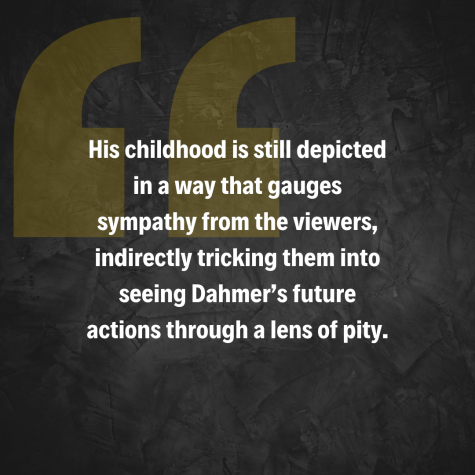“Monster: The Jeffrey Dahmer Story” is an unethical monstrosity
Examining the internet’s disturbing obsession with Jeffrey Dahmer
“Monster: The Jeffrey Dahmer Story” features actor Evan Peters, with the series’ poster portraying Peters staring menacingly into the audience’s eyes.
October 8, 2022
Content warning: This article contains mentions of murder, sexual assault and necrophilia. Reader discretion is strongly advised.
Focusing on cannibalistic serial killer Jeffrey Dahmer, “Monster: The Jeffrey Dahmer Story” depicts themes of childhood trauma, torture, rape, murder and necrophilia, the sexual attraction towards corpses. Released Sept. 21, the show is a 10 episode biographical drama that debuted number one on Netflix’s top 10 rankings, garnering 196.2 million hours in a week .
Dahmer would go to gay nightclubs and spas to pick up a majority of his victims, all Black, Latino or Asian. After luring the victims back into his apartment, Dahmer would rape them and their corpses, brutally dispose of their organs and even perform lobotomies, all of which were unsuccessful.
I’m not telling anyone what to watch, I know true crime media is huge rn, but if you’re actually curious about the victims, my family (the Isbell’s) are pissed about this show. It’s retraumatizing over and over again, and for what? How many movies/shows/documentaries do we need? https://t.co/CRQjXWAvjx
— eric perry. (@ericthulhu) September 22, 2022
Eric Perry, cousin of Errol Lindsey, calls out the show on Twitter
An essay written by Rita Isbell, Errol Lindsey’s sister, calls out Netflix for not obtaining consent from the victims’ families before bringing Dahmer’s story back into the spotlight. This triggered strong emotions and — according to Eric Perry, Errol Lindsey’s cousin — even post-traumatic stress for those who knew the 17 victims. Additionally, “Monster: The Jeffrey Dahmer Story” includes specific details of his childhood that humanize the killer: his parents’ divorce, his father and mother leaving him when he was 17, and the depression this chain of events put Dahmer into. Although it may not have been the show’s intent to justify the actions Dahmer would do later in his life, his childhood is still depicted in a way that gauges sympathy from the viewers, indirectly tricking them into seeing Dahmer’s future actions through a lens of pity.

However, others have praised the show for its portrayal of systemic racism in the judicial system. Dahmer took advantage of his white privilege, and the police officers’ overall ignorance enabled him to kill so many people. One instance of this was with 14-year-old Konerak Sinthasomphone. He was able to escape from Dahmer’s apartment, naked and with a hole drilled into his head, and managed to grab the attention of the police. However, upon Dahmer explaining how Sinthasomphone was his legally consensual lover, the police allowed Dahmer to bring the teenager into his apartment once more. Dahmer proceeded to kill him after the police left.
But despite such run-ins — as well as Dahmer’s neighbor calling to report the strange behavior and noises she’s seen and heard from Dahmer’s apartment — Dahmer was not arrested until one of his victims successfully escaped and took the police to investigate Dahmer’s apartment.
Hence, Netflix excelled in depicting racist double standards in the judicial system. However, there are ways to call attention to systemic racism without making yet another movie about a serial killer and the real people they killed. Shedding more light on a serial killer, while completely disregarding the wishes of the victims’ families is insensitive, thus the accurate portrayal of racism does not justify the show’s blatant breach of respect for the families.
Furthermore, social media’s widespread response to the show has not focused on its depiction of racism. Instead, it’s focused on the brutality shown within the show, with some users stating how they were unphased by the show’s violence and wanted to see more. Others have become enthralled by the serial killer, making fan edits of actor Evan Peters playing Jeffrey Dahmer and obsessing over Dahmer’s mugshots.
there is a whole trend of white women on tiktok flexing how they were so “unbothered” and “unfazed” by the dahmer series on netflix. if you find the depiction heinous targeted murders of LGBT and black/brown people “not disturbing enough” then something is wrong with you pic.twitter.com/Jjv8Bg5gKL
— em 🍓 (@uhhmmily) September 30, 2022
Social media user em on Twitter shares her opinion regarding TikTok’s reaction to the Netflix series
Both Netflix and many viewers of the show have glamorized Dahmer, spreading the belief that he was a good, but misunderstood, person. But, as seen through his actions towards his victims, it is clear how Dahmer was truly sadistic. There’s no reason to feel pity for a serial killer, whether it be his childhood trauma, the way he died or the way he is perceived by people today. Instead, have respect for the parents, siblings, children, friends and everyone else left to grieve because of Dahmer’s actions.
To “Monster: The Jeffrey Dahmer Story,” the viewers who enabled the show to become as popular as it did and the social media users thirsting over a serial killer, the only people you should be acknowledging and feeling heartbroken for are the 17 men who lost their lives: 14-year-old Jamie Doxtator, 14-year-old Konerak Sinthasomphone, 18-year-old Steven Hicks, 18-year-old Curtis Straughter, 19-year-old Errol Lindsey, 20-year-old Matt Turner, 23-year-old David Thomas, 23-year-old Jeremiah Weinberger, 23-year-old Oliver Lacy, 24-year-old Anthony Sears, 24-year-old Ernest Miller, 25-year-old Richard Guerrero, 25-year-old Joseph Bradehoft, 28-year-old Steven Tuomi, 28-year-old Eddie Smith, 31-year-old Anthony Hughes and 33-year-old Ricky Beeks.
Instead of feeling remorse for the person who killed 17 innocent men, feel remorse for the teenagers and young adults whose lives he took away. Feel remorse for their lost future, their untold past.
Feel remorse for them.



















